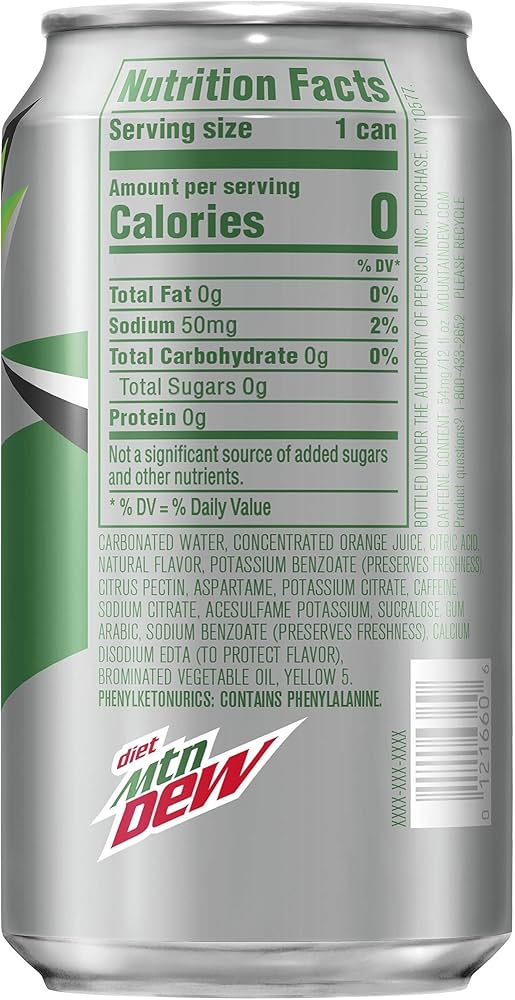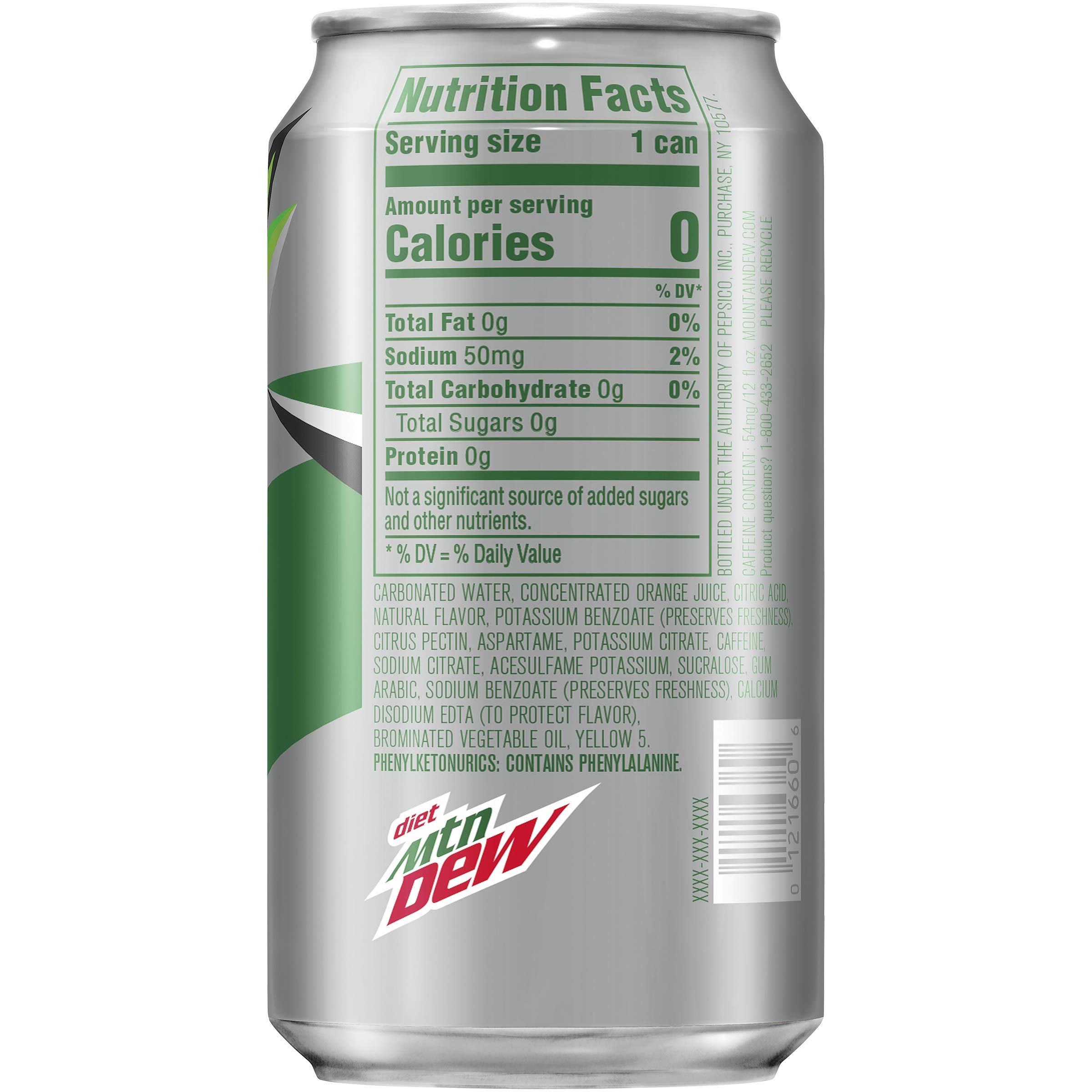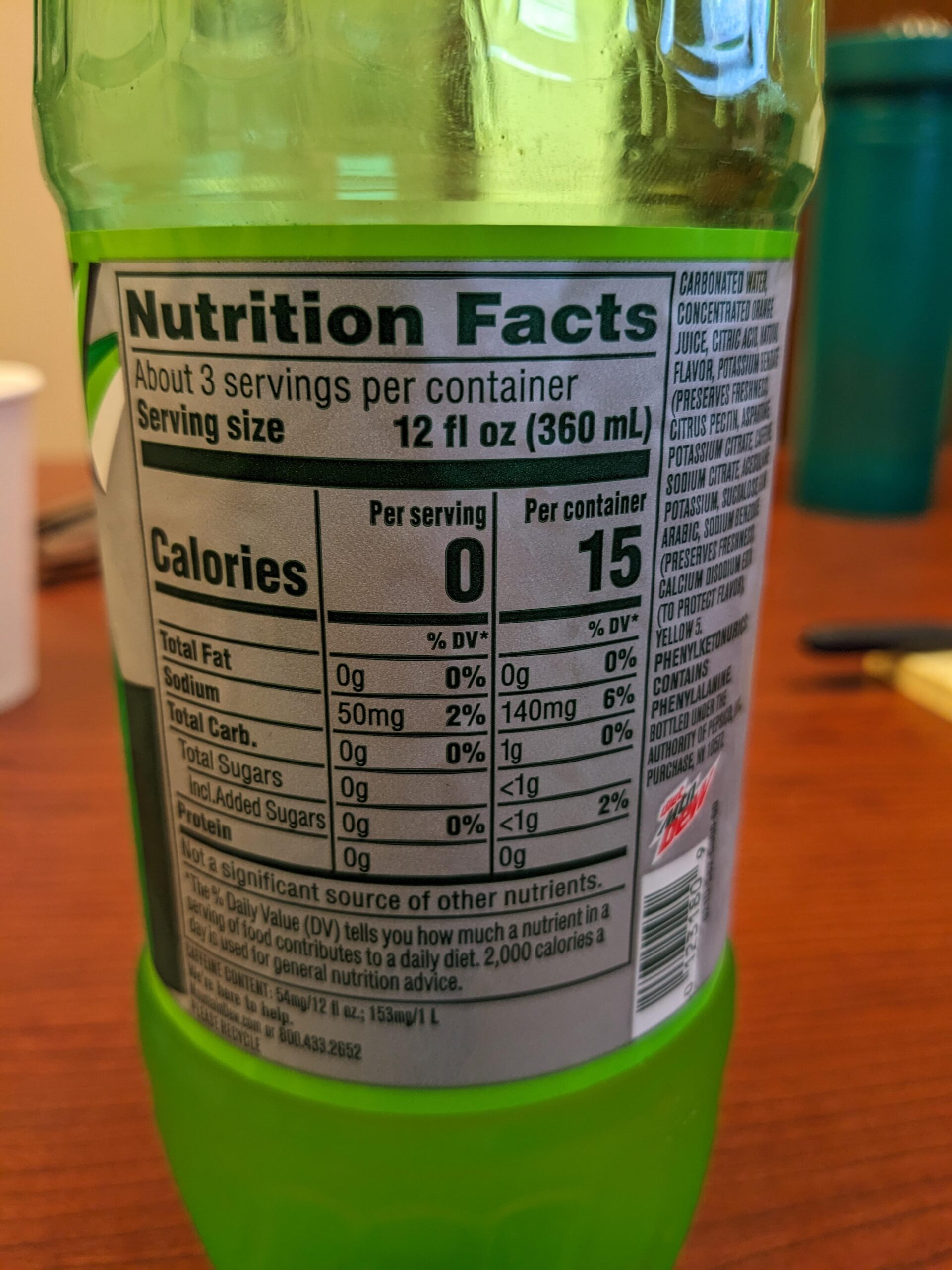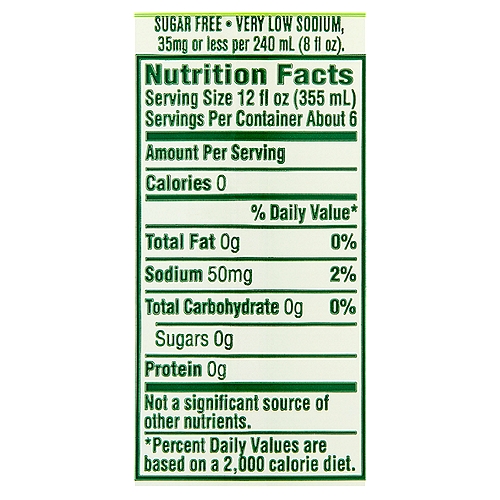Have you ever wondered about the nutrition information behind your favorite beverages? When it comes to soft drinks, Diet Mtn Dew often sparks curiosity regarding its ingredients and health implications. Let’s break this down in detail, addressing everything you need to know about Diet Mtn Dew.

This image is property of Amazon.com.
What is Diet Mtn Dew?
Diet Mtn Dew is the calorie-free counterpart of regular Mountain Dew, a popular citrus-flavored soft drink. If you’re looking for a sweeter refreshment without the extra calories, Diet Mtn Dew might seem like an appealing option. It maintains the signature flavor of its full-calorie counterpart while offering a diet-friendly alternative.
Ingredients: What’s Inside?
To understand Diet Mtn Dew better, it’s essential to look at its ingredients. Here’s a brief overview of what you might find in a can:
- Carbonated Water: The base of most soft drinks, providing that bubbly sensation.
- Citric Acid: This gives the drink its tangy flavor.
- Natural Flavors: These are proprietary mixes that provide the unique flavor profile of Mtn Dew.
- Aspartame: A frequently discussed artificial sweetener that adds sweetness without calories.
- Caffeine: Provides that familiar boost that many seek in soft drinks.
- Preserving Agents: Generally included to maintain freshness.
Understanding these components can help you determine how they fit into your diet.
Nutritional Information
Let’s break down the nutrition information for Diet Mtn Dew to give you a clearer picture of what you’re consuming. Here’s a summary of the nutrition per 12 fl oz (355 mL) serving:
| Nutrient | Amount per Serving | % Daily Value* |
|---|---|---|
| Calories | 0 | 0% |
| Total Fat | 0g | 0% |
| Sodium | 40mg | 2% |
| Total Carbohydrates | 0g | 0% |
| Sugars | 0g | 0% |
| Protein | 0g | 0% |
| Caffeine | 54mg | – |
*Percent Daily Values are based on a 2,000 calorie diet.
The most notable aspect of Diet Mtn Dew is its zero calories, making it a popular choice for individuals looking to reduce their caloric intake.
Caffeine Content
If you’re sensitive to caffeine or just curious, knowing its amount in Diet Mtn Dew can be useful. With 54 mg of caffeine per serving, it provides a boost comparable to a cup of green tea. Caffeine can enhance alertness and potentially improve mood, but moderation is key.
Artificial Sweeteners: Are They Safe?
One of the most debated aspects of Diet Mtn Dew is its use of aspartame. It’s a zero-calorie sweetener that is about 200 times sweeter than sugar. There is a lot of discussion surrounding artificial sweeteners, with supporters claiming they help manage weight and sugar intake while critics raise health concerns.
Research suggests that moderate consumption of aspartame is safe for most people, though some individuals may have sensitivities or conditions that necessitate avoiding it. Always consider your own dietary needs when assessing sweeteners.
Comparing Diet Mtn Dew with Regular Mountain Dew
Curious how Diet Mtn Dew stacks up against its regular counterpart? Let’s give you a quick comparison. Here’s what you might find in a 12 fl oz serving of Regular Mountain Dew:
| Nutrient | Regular Mountain Dew | Diet Mtn Dew |
|---|---|---|
| Calories | 170 | 0 |
| Total Fat | 0g | 0g |
| Sodium | 60mg | 40mg |
| Sugars | 46g | 0g |
| Caffeine | 54mg | 54mg |
By looking at this table, it’s evident that regular Mountain Dew is high in sugar and calories. This might make Diet Mtn Dew a suitable alternative if you’re looking to cut down those aspects.
Health Considerations
When making choices about your diet, it might be beneficial to consider both the pros and cons of consuming diet beverages.
Potential Benefits
- Weight Management: With zero calories, Diet Mtn Dew can fit into a calorie-controlled diet.
- Taste Satisfaction: It can satisfy a craving for something sweet and fizzy without adding to your daily calories.
- Caffeine Boost: If you enjoy a caffeine lift, Diet Mtn Dew delivers without the sugar crash.
Potential Drawbacks
- Artificial Sweeteners: Some may prefer to avoid artificial ingredients altogether.
- Fluid Retention & Sodium: Diet beverages can sometimes leave you feeling bloated due to their sodium content.
- Habituation: Relying heavily on artificially sweetened beverages might influence your cravings for naturally sweet foods.

This image is property of Amazon.com.
How Does Diet Mtn Dew Fit Into a Balanced Diet?
Integrating Diet Mtn Dew into your diet isn’t necessarily bad, but moderation is essential. Trying to balance your intake of diet beverages with plenty of water and natural drinks can maintain overall health.
Dietary Balance
Take a moment to reflect on your overall beverage consumption. Are you mostly sipping sweetened drinks, or do you enjoy water and herbal teas too? Striking a balance ensures that you’re nourishing your body while still indulging in the tastes you love.
Portion Control
Just because Diet Mtn Dew is calorie-free doesn’t mean you should consume it endlessly. Keeping to reasonable portions ensures that it complements your diet rather than dominates it.
Frequently Asked Questions
Can I drink Diet Mtn Dew during Weight Loss?
Definitely! If you’re limiting calories, Diet Mtn Dew can offer a tasty alternative to sugary sodas. Just keep in mind, it should be part of a well-rounded diet.
Does Diet Mtn Dew contain any vitamins or minerals?
While it does not offer significant vitamins or minerals, it provides hydration and a flavor boost. Aim to get vitamins and minerals from whole foods like fruits, vegetables, and grains.
How does the caffeine in Diet Mtn Dew compare to coffee?
With 54 mg per serving, the caffeine content in Diet Mtn Dew is similar to that in a cup of green tea, but lower than your standard cup of coffee, which can have upwards of 95 mg. If you’re sensitive to caffeine, it might be worth keeping track of your intake.
Is it bad to drink Diet Mtn Dew every day?
Moderate consumption is generally considered safe for most individuals. However, if you’re consuming it daily, be aware of your total caffeine and sodium intake, and balance it with your overall health goals.

This image is property of i.redd.it.
Alternatives to Diet Mtn Dew
If you’re looking to switch it up, there are plenty of alternatives to consider that may offer a similar faux-sugar flavor without calories. Here are some popular options:
- Sparkling Water: Flavored sparkling waters can satisfy fizzy cravings without any sweeteners.
- Iced Tea: Unsweetened iced teas provide hydration with a bit of taste and can be served cold.
- Herbal Infusions: Herbal teas can offer a delightful and soothing alternative without added sugars.
- Low-Calorie Soft Drinks: Look for other low-calorie or zero-calorie options if you prefer something similar.
Conclusion
Understanding the nutrition information and health implications of Diet Mtn Dew can aid you in making informed choices. While it offers a calorie-free alternative to sugary sodas, it’s essential to keep in mind the importance of moderation and balance in your diet. Each sip can be considered both a treat and a nutritional factor in your overall health journey. Remember, personal health goals can vary widely, so always listen to your body and what feels right for you.
Whether you choose to enjoy a refreshing Diet Mtn Dew occasionally or pair it with your meals, the key is to find what fits seamlessly into your lifestyle.

This image is property of assets.wakefern.com.